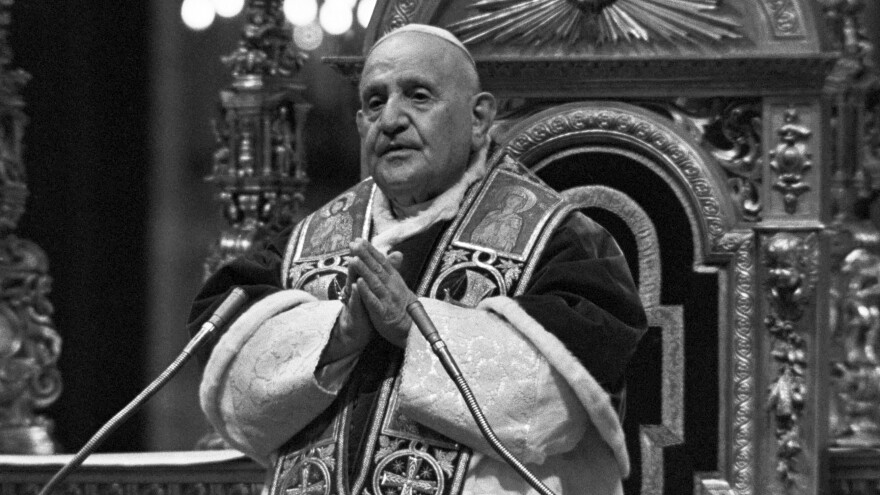Pope Francis will canonize two 20th-century Catholic giants on Sunday — one a pope beloved by traditionalists the other a pontiff who was the icon of Catholic liberals.
The Polish-born John Paul II was the first non-Italian pope in nearly 500 years. He traveled to every corner of the earth and helped bring down communism.
John XXIII was a Vatican diplomat in World War II who saved many Jews from the Holocaust. By calling the Second Vatican Council, or Vatican II, he opened the Church's windows onto the modern world.
The night Vatican II opened in 1962, the "Good Pope John," as Italians called him, saw from his window a crowd of torch-bearing faithful in St Peter's Square.
He addressed them – not in the arcane style of past popes – but with simple words still fondly remembered today.
"The whole world is represented here tonight," the pontiff said. "Look up, even the moon hurried to join us – and when you go home, hug your children and tell them it's a hug from the pope."

Ushering In Change
"John XXIII produced an earthquake at the end of the 50's. All was so fixed, so dogmatic," says Marco Politi, Vatican correspondent for the daily Il Fatto. Vatican II established new guidelines for the Catholic Church in the modern world, he adds.
"It put an end to the centuries-long anti-Semitism of the Catholic Church, Jews are no more the killers of Jesus Christ, they are brethren," Polti says. "After Vatican Council Two, Islam is no more a sort of pagan, strange religion. Vatican Council Two recognized that Muslims, Jews and Christians are praying to the same God. Which was unthinkable in the past century."
Vatican II dropped Latin from the mass, allowing it to be celebrated in all languages. Young Catholics today have no idea what the church was like before the council, says veteran Vatican analyst Robert Mickens.
"Catholics couldn't go into other churches, it was often difficult even to go to a wedding in another church, let alone go into a synagogue or mosque," Mickens says. "That's all changed, the council put Catholic Church and Catholic people in dialogue with the world, no longer standing apart, but walking with humanity."
John XXIII did not see the end of Vatican II but his deathbed words show he understood what he had put in motion.
"It is not that the gospel has changed; it is that we have begun to understand it better," he said. "Those who have lived as long as I have ... were enabled to compare different cultures and traditions, and know that the moment has come to discern the signs of the times, to seize the opportunity and to look far ahead."
The First Polish Pope
Fifteen years later, the College of Cardinals elected the first Polish pope and the youngest one in 125 years. John Paul knew how to command the global stage and how to use the mass media to spread the gospel.
"Do not be afraid, rather, open wide the doors to Christ, break down the borders of states, of economic and political systems, of vast fields of culture, of civilization and development. Do not be afraid," he said.
John Paul was the first pope to visit a synagogue and a mosque and used the papacy as a bully pulpit for human rights, Marco Politi says.
"He was first pope to call all leaders of the world religions to pray together for peace in Assisi and there were a lot of people in the Roman Curia and world (Catholic) Church who didn't agree to this fact which seemed to put the Catholic faith on the same level of the faith of other people," Polti says.
John Paul had participated in Vatican II as a bishop. But by the early 1980s he felt it had opened the floodgates to too much change.
Robert Mickens says one of the key aspects of John Paul's papacy was a crackdown on discussion of certain issues – such as sexual ethics and married priests.
"This is because of John Paul II's experience in Communist Poland was that a divided hierarchy or a hierarchy that was seen as not to be in total lock-step agreement was weakened in its proclamation, and so he imposed very strict obedience — same message, single-minded message for all the bishops," he said.
It was perhaps John Paul's experience with a Communist regime — which often discredited priests with false accusations — that led him to turn a blind eye for so long to the clerical sex abuse scandals that festered under his papacy and which critics say still tarnish his legacy.
John Paul's supporters say he knew nothing of the scandals because Vatican officials may have kept him in the dark.
The art of saint making also involves the art of politics.
Pope Francis' decision to canonize the pope loved by Catholic traditionalists together with the one favored by Catholic liberals is seen as part of his effort to keep Catholics united, inside one big tent.
Copyright 2022 NPR. To see more, visit https://www.npr.org.



